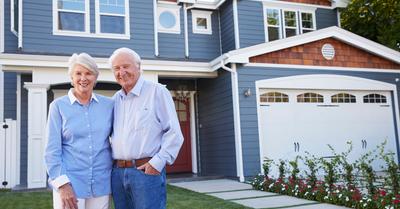Table of Contents
Independent Living Communities
Independent senior living is perfect for seniors who are self-reliant and do not require hands-on care. They can live in fully equipped private apartments with everything including a kitchenette or a full kitchen. In these communities, you'll be provided with a range of physical, intellectual, and social activities.
One of the main benefits of independent senior living is the carefree lifestyle that is free of many taxing responsibilities: housekeeping, laundry, meal preparation, and house maintenance. Although you'll enjoy a carefree lifestyle in an independent senior living community, these communities generally provide very few if any amenities.
Generally, independent living communities have a minimum age requirement of 55 or 62. Some services offered may include meal preparation, housekeeping, and transportation may be provided but residents tend to be independent and self-reliant.
Other Names for Independent Senior Living
- 55+ communities
- Retirement homes
- Senior apartments
- Active senior living
- Active senior communities
- Retirement communities
Benefits of Independent Senior Living
Independent senior living is perfect for seniors who are either mostly or fully independent but want to be in the company of their age mates. It can also be appropriate for those who want to enjoy amenities such as meal preparation, laundry, and house maintenance. Most of these communities promote active and healthy lifestyles.
Some of the benefits of independent senior living communities include:
- On-site and off-site activities
- Community involvement
- Maintenance-free living
- Opportunity to pursue self-actualization
Common Services Offered in Independent Senior Living
- Exercise and activity programs
- Chef-prepared and restaurant-style meals in a community dining room
- Maintenance and repair of appliances
- Scheduled transportation for medical, shopping, and off-site activities
- On-site barber shops, beauty salons, and spa
- All-inclusive utilities such as telephone and internet
- Activities, entertainments, and events
- Housekeeping and laundry
Costs of Independent Senior Living
The costs of independent senior living may vary greatly. This may depend on factors such as the geographical location of the community and, of course, the size of the apartment. For instance, an independent senior living community located in a bigger city such as Los Angeles may be costlier than an independent senior living located in a smaller city.
There are various senior apartments that are subsidized and have low rent. The amount of rent that you pay may be calculated based on a given percentage of the resident's income. On the contrary, other independent senior living communities may be posh and luxurious and, therefore, more expensive.
That being said, the average cost of a one-bedroom independent senior apartment is $2,500 per month. However, less posh apartments can cost significantly less. It's, therefore crucial that you as operators of these communities about individual costs and services since the costs can vary from community to community. For instance, there may be additional costs for extra services such as concierge services.
Whether posh or affordable, independent senior living generally is a quiet and peaceful living option for seniors who are still independent and self-sufficient. It can be perfect if you want to avoid the hustles and bustles that come with living in family apartments.
Assisted Living Communities
Assisted living communities generally offer housing and care to senior citizens who may require some assistance with various daily tasks but do not necessarily need skilled care or assistance like the ones provided at a nursing home. Some of the assistance provided may revolve around activities such as housekeeping, meals, medications, and other activities of daily living.
Although residents live in private apartments, the staff is available round the clock. These communities may come in all shapes and sizes. For example, they can be expansive complexes in the suburbs, apartment buildings in an urban center, or intimate communities in rural areas that cater to a few residents.
Assisted living can be perfect for seniors who are mostly independent but may need various day-to-day living. It can also be perfect for senior citizens who are independent but anticipate that they may need care in the near future.
Other Names for Assisted Living
- Personal care homes
- Adult congregate care
- Residential care facility
- Assisted living facility
- Assisted living residence
Benefits of Assisted Living
One of the main benefits of assisted living is that they must adhere to the licensing and regulation requirements. These requirements may, however, vary from state to state and can affect the type of care or services offered.
With that in mind, the services provided may vary from one community to the other. Generally speaking, most assisted living communities offer their residents' basic medical monitoring and can also help residents with daily activities and care. Most of these communities help residents with activities such as eating, hygiene, dressing, mobility, bathing, shopping, use of telephone, and toileting.
Common Services Offered in Assisted Living Communities
Some of the common services offered in assisted living communities include:
- Health and exercise programs
- Transportation
- Social programs
- Access to medical services
- Provision of meals
- 24-hour supervision and security
- Housekeeping
- Laundry
- Maintenance and repair of appliances
Costs of Assisted Living
Most assisted living communities generally charge a flat rate for the services provided but there may be additional fees for special services. On the other hand, some assisted living communities apply what is known as a "la carte payment system." This is where residents are only charged based on the services that they seek or utilize.
While the average cost of assisted living is about $3,500 per month, this may vary depending on several factors such as:
- Size of the apartment
- Type of residence
- Type of services provided
- The level of luxury
- The geographical location of the community
In most cases, the cost of assisted living covers normal services such as rent and meals while care is always deemed as an additional service. All in all, these costs may vary from community to community so it's important for the fees and services offered.
Nursing Homes
Nursing homes provide residential care for seniors who require 24-hour supervision and medical assistance. Nursing homes are perfect for seniors who suffer from severe and incapacitating mental or physical conditions that may not enable them to take care of themselves. In most cases, residents are wheelchair-bound, bedridden, or have medical needs that call for daily skilled nursing care.
Many modern nursing homes not only provide daily skilled nursing care but also provide physical needs for individual residents based on their physical needs. They also offer extra amenities such as restaurant-style meals.
Other Names for Nursing Homes
- Convalescent homes
- Skilled nursing facility
- Old people's homes
- Care homes
- Long-term facilities
Benefits of Nursing Homes
You should consider a nursing home if you're looking for the best deal when it comes to dealing with the problems of getting older. Nursing homes will not only ensure that your or your loved one receives the highest standards of care from skilled nurses but can also be an excellent choice for seniors who have numerous health problems and cannot cope in their own homes.
Again, nursing homes are typically stocked with medical equipment such as electronic beds, X-ray machines, and in-house pharmacies. These are essential in catering to the needs of the residents and can provide care for seniors suffering from diseases such as dementia and Alzheimer's.
Here are some of the benefits of a nursing home.
- Provision of healthcare services
- Assistance with day-to-day living
- Safety
- Relieving the strain of family members
- Social engagement
- Specialized healthcare
- Access to modern technology and other resources
Services Offered in Nursing Homes
Some of the services offered in nursing homes include:
- Three daily meals
- Comfortable private and semi-private rooms
- Exercise and physical therapy programs
- Housekeeping and laundry service
- 24-hour service and personal assistance
- Social programs and activities
- Speech therapy
- Hospice care, pain management, and medication
The Costs of Nursing Homes
The cost of a nursing home generally depends on the duration of a resident's stay. In terms of long-term stay, the costs can be around $240 per day for a private room but this may be affected by various factors such as the size of the room, type of the room (private or semi-private), and the geographical location of the nursing home.
On the other hand, nursing homes can provide short-term stays, especially for those who are hospitalized due to illness, injury, or supervised care while in recovery. Most of these short-term care can be covered by Medicare if you're eligible for the benefits.
Residential Care Homes
A residential care home is essentially a residential setting where a given number of senior citizens are taken care of. A home that's registered as a residential care home will provide various personal care such as dressing, laundry, and medication. Residential care homes generally provide 24-hours live-in services and assistance for residents, though the number of residents may be limited at any given time.
Other Names for Residential Care Homes
The common names for residential care homes include:
- Board and care home
- Personal care home
- Adult foster care home
- Group home
- Adult family care home
Benefits of Residential Care Homes
One of the main benefits of residential care homes is the family ambiance that they offer. They generally offer smaller home-like settings and offer more services than assisted living facilities. Most residential care homes across the U.S. are run by qualified and highly-experienced nurses.
They, however, offer less organized activities especially when compared to assisted living communities and tend to have fewer residents. As such, residential care homes offer more intimate, family-like, and dynamic services to residents. If anything, residents may share the home with the operators and their families, thereby having the opportunity to intermingle with various generations regularly.
The Types of Services Offered in Residential Care Homes
The level of care provided in residential care homes may vary widely but they can be compared to the services offered in nursing homes. Some of the services include:
- Supervised care
- The provision of home-cooked meals
- Medication management
- Housekeeping
- Laundry services
- Transportation
- Social programs and activities
Again, residential care homes may also offer additional services and care that may fit every individual.
The Cost of Residential Care Homes
The cost of living in a residential care home is generally more affordable than living in an assisted living community or in a nursing home. But even with that, the cost of living in a residential home may depend on a number of factors such as the type of services provided, the geographical location of the residential care home, room privacy, and the level of luxury provided. The average cost of a residential care home may range between $1,500 and $4,500 per month, although dementia care may cost even more.
Memory Care
Many seniors not just across the U.S. but around the entire globe suffer from Alzheimer's and dementia. As such, they may need Alzheimer's and dementia care and this is where memory care comes in handy. While memory care can be provided on its own, it's generally provided in a secure area within a nursing home or assisted living community, typically on a different wing or a separate floor. These communities are often run or employ skilled staff members who are specifically trained to care for those with these diseases.
Given that the most common and dangerous symptom of Alzheimer's and dementia is wandering off and getting lost as a result of a loss of memory, one of the most important aspects of memory care is security. In other words, memory care must be secure to ensure that residents do not wander off or get lost. That's essentially why memory care communities have alarm exit doors and not locked exit doors.
Other Names for Memory Care
- Dementia Care
- Alzheimer's Care
- Alzheimer's Special Care Unit
Benefits of Memory Care
Dementia and Alzheimer's are diseases that may progress with age and this will mean that a patient needs an increased level of care. Although many families may prefer to keep their loved one at home for as long as possible, it will reach a point where the individual suffering from any of these diseases requires 24-hour supervised care, especially in a secure area or environment.
That being said, the main benefit of memory care is that it prevents residents from wandering off or getting lost. These communities usually employ specially trained staff to take care of the residents and monitor them round the clock while assisting them with their day-to-day activities such as eating, bathing, dressing, and grooming.
The Types of Services Offered in Memory Care
Here are some of the services offered in memory care communities.
- 24-hour supervised care
- Art and music therapy
- Three meals
- Medication management
- Housekeeping and laundry services
- Social programs and activities
- Exercise and physical therapy programs
- 24-hour personal assistance
The Costs of Memory Care
The cost of memory care is usually higher than other forms of senior housing and may range between $2,000 and $7,000 per month. This is because there's a need for more staff than other types of senior housing. For instance, memory care requires more specialized staff and training to ensure that all residents are safe at all times.
Keep in mind that these costs may vary widely depending on several factors such as the size of the room, level of care needed, type of room, and geographical location of the memory care community.
Home Care
It is sometimes in the best interest to ensure that a senior citizen remains in his/her own home and receives care from there. Well, home care can allow seniors to remain in their homes and still receive and still receive various assistants to help them remain active, independent, happy, and, of course, healthy.
According to statistics from the U.S. Census Bureau, more than 7.6 million senior citizens in America receive home care. If anything, this figure can be even large if you take into account the informal care that's provided to the elderly by friends and family.
Other Names for Home Care
- Aging in Place
Benefits of Home Care
When it comes to home care, the most important thing is to ensure that a senior's home is perfectly modified to address mobility issues if any. This type of care can be great for seniors who can still handle most tasks on their own but can have assistance should there be any problem. In other words, it's perfect for seniors who need minor help with daily living activities. It's also cheaper and will provide the senior with the independence he/she desires.
Services Offered
The common services offered include:
- Meal preparation
- Transportation
- Paying bills
- Companionship and emotional support
- Bathing
- Dressing
Most of these services can range from hourly, daily, or weekly visits by caregivers.
The Costs of Home Care
As we've just noted, this is one of the most affordable types of senior housing and can cost about $20 per hour.
Adult Day Services
These services usually involve taking care of the elderly whether at home or in a given community on a daily basis. These services can be offered half-day or full-day and may include transporting the seniors to and from the community where the services are provided.
Other Names of Adult Day Services
Other names may include:
- Adult daycare
- Adult day programs
Benefits of Adult Day Services
Generally, adult day services are tailored to provide seniors with both social activities and health care services, especially if they have cognitive impairment and/or physical disabilities. They can be beneficial to seniors who are frail or even lonely by just sitting at home. They're also essential for seniors who want to break from time to time and get involved in a host of activities.
Services Offered
Some of the services offered include:
- Therapeutic activities
- Nursing care
- Personal care
- Nutritious meals
Costs of Adult Day Services
Generally, participants of these services prefer paying privately whenever they need the services. The average cost of these services is about $65 per day.
Respite Care
Caregiving is, without a doubt, a demanding career and most caregivers are not equipped to do it alone without breaks. But to give your caregiver a break to recharge his/her batteries and spend some valuable time with friends and family, it would make sense to spend a couple of days at a senior community. This is what's known as respite care.
Respite care essentially provides temporary relief to the caregiver so that he/she can have a much-needed break from the demands of caregiving. Under such a scenario, the elderly may have to move to a senior community for a few days.
Benefits of Respite Care
Here are some of the benefits of respite care.
- It can be an appropriate way to try whether or not a senior community can be right for the elderly.
- The caregiver needs a break or is traveling.
- The patient needs to change the setting for a given period.
- If there's a plan to gradually ease the senior into a senior community.
Services Offered
Some of the services offered in respite care include:
- Three nutritious meals
- Housekeeping services
- Laundry services
- Medication management
- Activities and outing
- Assistance with personal care such as toileting, grooming, bathing, and dressing
Costs of Respite Care
In most cases, respite care usually takes a couple of days and can cost between $75 and $200 depending on the geographical location and they type of services that the individual may need. You can take advantage of long-term care insurance policies as they normally cover such respite care costs.
Conclusion
To this end, it's easy to see that senior citizens usually have special needs and requirements when it comes to housing. There are numerous options to choose from, depending on your condition, budget, and requirements. Make sure that you go for senior housing that perfectly suits your conditions and make your golden years much better.
Recent Articles


















